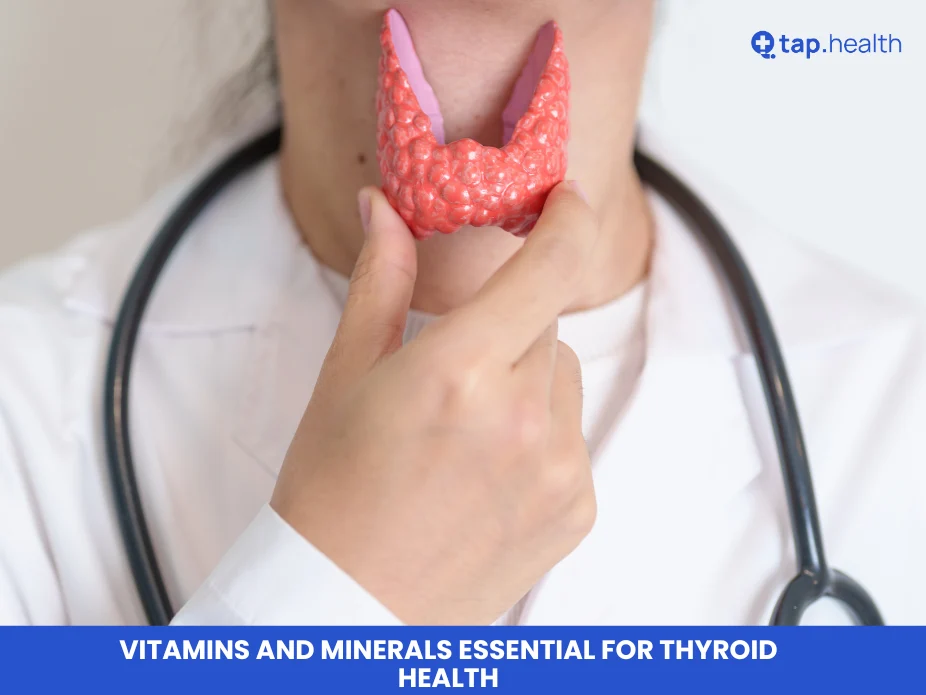Thyroid health plays a crucial role in your overall well-being, influencing your metabolism, energy levels, and mood. Your thyroid, a small butterfly-shaped gland in your neck, produces hormones that regulate many vital processes in the body. When your thyroid is not functioning properly, it can lead to a range of symptoms such as fatigue, weight changes, and even heart problems.
One of the most important ways to support thyroid health is through proper nutrition. A diet rich in the right vitamins and minerals can help maintain optimal thyroid function, prevent deficiencies, and even address some thyroid-related conditions. In this blog post, we’ll explore the key vitamins and minerals essential for thyroid health and how to incorporate them into your diet.
Why Vitamins and Minerals Matter for Thyroid Health
Thyroid hormones, mainly T3 (triiodothyronine) and T4 (thyroxine), regulate your body’s metabolism and energy. These hormones are synthesized using iodine and require other nutrients like selenium, zinc, and vitamin D to function correctly. Without adequate levels of these vitamins and minerals, your thyroid can’t operate at its best, leading to potential problems such as hypothyroidism (underactive thyroid) or hyperthyroidism (overactive thyroid).
Research shows that deficiencies in certain nutrients can directly impact thyroid health and exacerbate thyroid dysfunction. On the other hand, a well-rounded diet rich in thyroid-supporting vitamins and minerals can help keep your thyroid in good working order.
Key Vitamins and Minerals for Thyroid Health
1. Iodine: The Essential Mineral for Thyroid Function
Iodine is perhaps the most well-known mineral for thyroid health. It’s required by the thyroid gland to produce the T3 and T4 hormones. Without iodine, your thyroid can’t make enough of these hormones, leading to conditions such as goiter (swelling of the thyroid) and hypothyroidism.
Sources of Iodine:
- Seaweed (Kelp, Nori, Wakame): One of the richest sources of iodine.
- Fish: Cod, tuna, and shrimp.
- Dairy: Milk, cheese, and yogurt.
- Iodized Salt: A common source of iodine in many diets.
Why It Works: Iodine is essential for hormone production, and without it, your body’s metabolism can’t function properly. Too little iodine can cause your thyroid to become enlarged in an attempt to produce more hormones, leading to a goiter.
Expert Contribution: Dr. William A. P. Bozeman, an endocrinologist, emphasizes that “Iodine deficiency remains one of the leading causes of thyroid dysfunction globally, particularly in regions with limited access to iodine-rich foods” (Source).
2. Selenium: The Antioxidant that Protects Your Thyroid
Selenium is a trace mineral that plays a significant role in the thyroid’s ability to convert T4 into the more active T3 hormone. It also acts as an antioxidant, protecting the thyroid gland from oxidative stress and damage caused by free radicals.
Sources of Selenium:
- Brazil Nuts: Just a few nuts per day can meet your selenium needs.
- Sunflower Seeds: Another excellent source of selenium.
- Fish: Tuna, sardines, and halibut.
- Eggs: Rich in both selenium and iodine.
Why It Works: Selenium helps ensure that thyroid hormones are produced and activated efficiently. It also helps protect the thyroid from inflammation and oxidative damage, which can impair its function over time.
3. Zinc: A Key Player in Thyroid Hormone Production
Zinc is another essential mineral for thyroid health. It helps in the production of thyroid hormones and supports the immune system. Zinc deficiency has been linked to hypothyroidism and other thyroid-related disorders.
Sources of Zinc:
- Pumpkin Seeds: Packed with zinc.
- Oysters: One of the richest sources of zinc.
- Legumes: Beans, lentils, and chickpeas.
- Red Meat: Beef and lamb are rich in zinc.
Why It Works: Zinc is vital for the synthesis and activation of thyroid hormones. It also supports the immune system, which is crucial in preventing autoimmune thyroid diseases like Hashimoto’s thyroiditis.
4. Vitamin D: Crucial for Immune and Thyroid Health
Vitamin D is often referred to as the “sunshine vitamin” because your body produces it when exposed to sunlight. It plays a vital role in immune function and may help protect against autoimmune thyroid diseases. Low levels of vitamin D have been linked to hypothyroidism and other thyroid disorders.
Sources of Vitamin D:
- Fatty Fish: Salmon, mackerel, and sardines.
- Egg Yolks: A good source of vitamin D.
- Fortified Foods: Some dairy products and cereals are fortified with vitamin D.
- Sunlight: The most natural source of vitamin D.
Why It Works: Vitamin D helps regulate the immune system and has been shown to play a protective role against autoimmune thyroid diseases like Hashimoto’s thyroiditis, where the body attacks its own thyroid gland.
5. Vitamin B12: Boosts Energy and Supports Thyroid Health
Vitamin B12 is essential for energy production, brain function, and the synthesis of red blood cells. It also plays a role in thyroid health, especially in preventing fatigue related to hypothyroidism.
Sources of Vitamin B12:
- Meat and Poultry: Chicken, turkey, and beef.
- Fish and Shellfish: Salmon, tuna, and clams.
- Dairy Products: Milk, yogurt, and cheese.
- Fortified Foods: Some plant-based milks and cereals.
Why It Works: Vitamin B12 helps support metabolism and energy levels. A deficiency in B12 can lead to fatigue, which is a common symptom of an underactive thyroid.
Foods to Include in Your Diet for Thyroid Health
Incorporating these vitamins and minerals into your daily diet can help support thyroid function. Here’s a simple thyroid-friendly eating plan:
- Breakfast: A smoothie with spinach (zinc), banana, and fortified almond milk (vitamin D), topped with chia seeds (selenium).
- Lunch: A salad with mixed greens, salmon (vitamin D, selenium), and pumpkin seeds (zinc), dressed with olive oil.
- Dinner: Grilled chicken (zinc, vitamin B12) with steamed broccoli and a side of quinoa (selenium).
- Snacks: Brazil nuts (selenium), yogurt (iodine), and a boiled egg (selenium, iodine).
What to Avoid for Thyroid Health
While certain vitamins and minerals support thyroid health, others can interfere with thyroid function. These include:
- Goitrogenic Foods: Foods like cabbage, broccoli, cauliflower, and soy can interfere with iodine absorption if eaten in excessive amounts.
- Processed Foods: High in sugar and unhealthy fats, processed foods can cause inflammation, which may negatively affect the thyroid.
- Excessive Soy: Soy products can inhibit the thyroid’s ability to absorb iodine, particularly in people with existing thyroid issues.
Recent Research and Recommendations
Recent studies emphasize the importance of a balanced diet rich in essential micronutrients to maintain thyroid health and prevent disorders. While supplementation can be beneficial for certain populations, such as those with deficiencies or specific thyroid conditions, it is crucial to avoid excessive intake, particularly of iodine, as it can lead to adverse effects.
FAQs on Vitamins and Minerals Essential for Thyroid Health
1. Can I get all the vitamins and minerals I need from food?
Yes, most people can meet their vitamin and mineral requirements through a balanced diet. However, some individuals may need supplements, particularly for vitamin D or B12, if they have specific deficiencies.
2. How can I improve my thyroid function naturally?
A healthy diet rich in iodine, selenium, zinc, and vitamins D and B12 can help support thyroid function. It’s also important to manage stress, get enough sleep, and avoid environmental toxins.
3. What foods should I avoid if I have thyroid problems?
Avoid goitrogenic foods like raw cruciferous vegetables, excessive soy, and processed foods. These can interfere with thyroid function when consumed in large amounts.
Conclusion
Supporting your thyroid health with the right vitamins and minerals is one of the best ways to maintain proper function and prevent thyroid-related problems. Incorporate iodine, selenium, zinc, vitamin D, and B12 into your diet to keep your thyroid in optimal condition. Always consult with a healthcare professional if you suspect thyroid issues or nutrient deficiencies to create a plan tailored to your needs.
For more information on thyroid health and diet, check out these authoritative sources:



